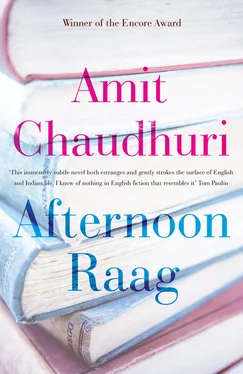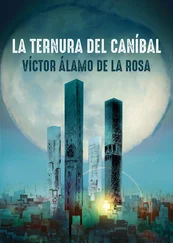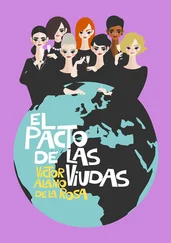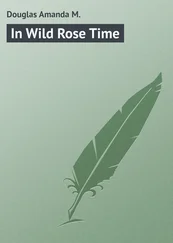His room used to blaze with pictures of gods and goddesses. Each student inhabits at the beginning of the year a room with blank walls and empty shelves, and then makes of it what he will. Sharma stuck calendar pictures on the wall, in red, blue, orange, Kali biting her tongue, Parvati riding a tiger. They reminded me of roadside kitchens, of the backs of lorries, and the small radiant picture before the bus driver’s seat. With their octopodal limbs, Kali’s face faintly reminiscent of Hema Malini’s, they were such good companions of the common man at home. Although they would have had no place in a middle class house in Bombay, here in England, in Sharma’s room, they existed for a while comfortingly and unironically.
By our second year, books occupied every inch of available space in the room. Sharma wished to understand the European mind, and nowhere so clearly and accessibly was Western culture contained as in books, and it was these books — Hawking’s A Brief History of Time, The Norton Anthology of English Literature , Collins’ Thesaurus, One Hundred Years of Solitude— that were placed on Sharma’s bookshelf. Many of them he did not read; but even buying a book at Blackwell’s was a discovery; in one book was contained science; in another, meaning and pronunciation; in another, literature. Even novels, he found, had a peculiar wisdom to impart that he was not wholly unfamiliar with, having read the ancient Hindu epics; although as a child, studious and earnest, he had never read storybooks for being too trivial.
When, after midnight, we would settle down to a conversation, it would continue to the small hours of the morning, as, gradually, the graduate building became still around us, and Sharma told me of his childhood. His village was like a fiction; it had no electricity; it was not to be found on the map of India. He confessed this with a mixture of deprecation and pride. Such was the intensity of the dark in that village that when the landlords lit their petromax lamps a mile away the shadow of that light fell on the earthen walls of Sharma’s house. His mother, whose photograph now hung in his room, was a frail woman of puritan fervour and great vision; his father was an idle, fun-loving dandy who liked nothing more than a gossip with the other men of the village. These two, for the most part, treated each other like distant relatives and led their own lives. Sharma and his older brother grew up in their mother’s wings in a village which, with its vain and ignorant landlords, its huddled families, its canals, fields, and thunderstorms, was a little universe. Sharma travelled outward first by foot, to a school in a neighbouring town; then, years later, on a train, he arrived at the big city; and finally, by another train, he went to Delhi. During our conversations, I grew familiar with the shadowy, marginal figures — well-wishers, relatives, friends, villains, and oppressors — who all, without knowing it, became impartial co-ordinates in his determined but steady progress outward, away from them. As he spoke, I would smell chick-peas being roasted in their shells; I would wake up one morning to find the ceiling in an uncle’s room had collapsed around him, barely disturbing his sleep; I would be full of revolutionary rhetoric when officials rigged the local elections; I would dress as Hanuman the monkey on a festival; I would travel sitting on the floor of a third-class train compartment to Lucknow; I would hear the roar of motorcycles and taste dust as the landlord’s sons arrived at the earthen house. When Sharma spoke, reality and fancy, my past and his, became reordered in new proportions.
He was a sensitive person. A memory, a poem, or a song could move him so much that sometimes a tear, large and sticky, would roll out from a corner of his eye when he was recounting it to me. He would either wipe it away with a quick, self-conscious movement, or dab his eye patiently with his handkerchief. There were occasions when I would say something that would offend him, and we would not speak to each other for hours, or even the whole day.
One evening, he came down to my room in his shorts, with a cup of coffee in his hand. This was not unusual; it meant that we were going to be engaged in a conversation which would take us to the realms of autobiography, or throw us into an abstract discussion on religion, or make us pause over the nuances of literary experience. His face was grave, like one who has something important to communicate — perhaps a piece of bad news. ‘I am very happy,’ he said solemnly, ‘that you are studying Lawrence.’ I gave this remark its due weight. ‘Last night, in my room, I read “Snake”. It is beautiful,’ he said. ‘Then I read “Ship of Death”. It’s great poem, it is very rich. But I cannot decide between the two.’
Taking out, without further digression, my copy of the Complete Poems , he read out loud and clear, as if he were singing:
Have you built your ship of death, O have you?
O build your ship of death, for you will need it.
Coming next to me, he pointed out these lines, asking me, quite seriously, if I had read them:
A little ship, with oars and food
and little dishes, and all accoutrements
fitting and ready for the departing soul…
‘Of course you must have,’ he conceded apologetically. ‘I believe you must have read every word by Lawrence.’
Each time these lines bring to me the idea of a seascape, and sometimes other conflicting pictures, like the memory of daal and sweet-potatoes being ground and mashed all day in the kitchen, then patted, shaped, and fried into pithhas, and left overnight in syrup; my mother choosing the brownest one for me, and the little less perfect one for my father.












